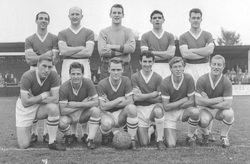
Perhaps because of that, I have long been interested in the social and political aspects of soccer. The identification with a community through the club has usually seemed a positive thing to me, especially at a level low enough for opponents to be adversaries rather than enemies, and at which you can still enjoy a drink and some banter with the other team's fans.
In my travels, I have encountered time and again the power of soccer to overcome cultural barriers and provide a source of shared enjoyment.
The great thing about soccer is its simplicity. The rules are few and simple, and you can make them fewer and simpler, or ignore them altogether, for a kick-around, for which the only equipment you need is a ball of some kind, and a couple of markers to indicate a goal. Many of the great soccer players have emerged from a poverty that made much more than that impossible. When I lived in Luanda, the capital of Angola, there was a kick-about on a patch of waste ground between blocks of flats outside my window that lasted virtually 24 hours a day, never mind the vicissitudes of weather, education or civil war. It is probably still going on. In the meantime, Angola has progressed from hopeless outsiders at every sport to a team that performed well at the World Cup in Germany (and perennial African champions at basketball).
For many years, such considerations led me to see soccer as the great equalizer, a level playing field on which merit was master and a referee provided justice that could not be bought, following rules agreed to by everyone. That, obviously, was never the whole story, but, being a fan, I was unwilling to see how deeply soccer results were conditioned by spondulix. Referees were always biased against my team, of course, but that was in the natural order of things: they were either blind or born out of wedlock; never bought. Now, having sought and examined a great deal of evidence, I can no longer believe that. What is more, corruption in soccer turns out to be as old as the game itself. However, there is a new and disquieting feature to it.
Even as recently as the latest Italian soccer scandal bar one (I live in Italy), it was about people trying to buy better treatment and better results, i.e. success, for their club. That has now become secondary. The latest scandals in Italy and around the world are about players and referees being bought by illegal betting syndicates. This is because millions of dollars can be bet on outcomes: not just who wins, but how many goals are scored in a match, the time of the first foul and other seemingly irrelevant but controllable events. The players who are bought are now doing something previously unheard-of: deliberately acting against the interests of their team, even playing to lose.
I hate this ruling-out of the equalizer so much that when it came to devising a really immoral anti-hero, I made him a corrupt international soccer official. However, we all like to believe that no-one is beyond redemption, so in "Linehan's Trip" that official witnesses atrocities which make him re-assess his whole attitude to life and decide to try to reform. In the sequel, "Linehan Saves", he goes on a mission to China, where corrupt players have been sentenced to death, and his new-found good intentions are severely tested.
Soccer, as I see it, is a microcosm of the wider world. The health of both is being severely tested at the moment. As, indeed it always is. Both face destruction, and time is running out. More than ever, we need an equalizer.
***
Author Bio
Bryan Murphy is a sceptical optimist who for some reason believes that his future will get better as the world's gets darker. He recently gave up correcting other people's broken English and now concentrates on putting together his own. He divides his time among England, Italy, the wider world and cyberspace, and welcomes visitors at: http://www.bryanmurphy.eu His latest e-book, Linehan Saves, is currently available free at Smashwords: https://www.smashwords.com/books/view/323609
 RSS Feed
RSS Feed